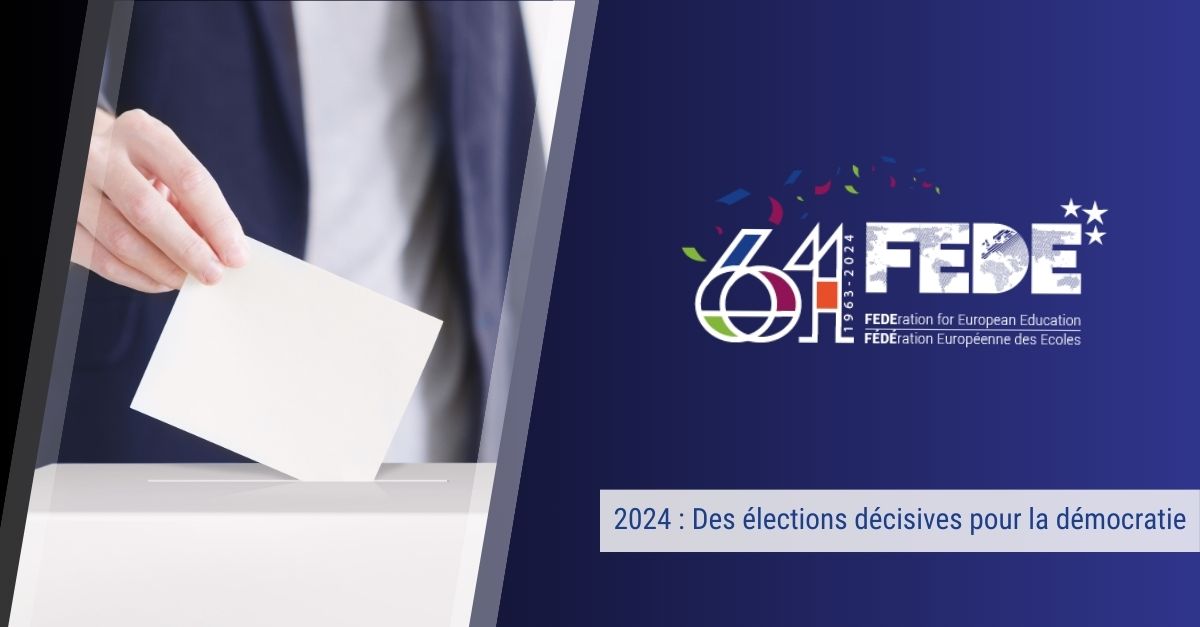The year 2024 promises to be a period of electoral density unequalled since universal suffrage was first introduced in 1792 by a pioneering country, France, at a time when only men had the right to vote. On a global scale, this year no fewer than 4.1 billion people – half the world’s population – will be voting. There will be an abundance of democratic activity in 68 countries, with a wide range of polls including presidential, legislative, regional and municipal elections. These countries include demographic giants such as the United States, Brazil, Mexico, India, Pakistan, Bangladesh, Indonesia and Russia, which are eight of the ten most populous countries in the world. While some of these countries enjoy a well-established democratic tradition, others are still in the early stages of their democratic experience. Others still, although they have a formal electoral process, remain autocracies offering their electorates a limited range of choices.
The European elections in June 2024
In 1946, in a speech to young students in Zurich, Winston Churchill set out a bold vision for the peace and security of European nations. He put forward the idea that the creation of a structure where the European family could live together in freedom and security would be the remedy needed to prevent war on the Old Continent. He envisaged a kind of United States of Europe. Churchill had formulated an idea that would later inspire the creation of the European Union: peace through interdependence and unity through diversity. The founding of the European Economic Community (EEC) in 1957 marked the beginning of an era in which the nations of the continent jointly committed themselves to meeting the challenges of the future, thus building a bulwark against the past horrors of armed conflict. Today, 67 years after it was first established, the European Union is preparing to renew its democratic mandate when elections are held for its Parliament, the Union body directly elected by European citizens, in June 2024.
Nearly 400 million European voters are invited to exercise their right to vote for the renewal of the Parliament in the 27 Member States, against a backdrop of a significant rise in far-right and Eurosceptic movements, reflecting the trends observed over several months in a number of European countries. These elections, which genuinely reveal the continent’s political aspirations, set the course for future European integration. Following this vote, the Member States are preparing to renew the Union’s major institutions, namely the European Commission and the Council of the EU, and to outline a new legislative roadmap, marking the start of a new political agenda for the 2024-2029 period.
Polls with global repercussions: from democratic anxiety in America to the affirmation of Taiwanese sovereignty
Three years have passed since Donald Trump’s supporters stormed the Capitol on 6 January 2021, an event that has left deep and enduring scars on the American political landscape. This indelible mark is being keenly felt in the current electoral campaign for the presidential election on 5 November. The prospect of a possible return to power of the former president, who is running against Joe Biden in this crucial election, threatens to upset the already precarious geopolitical balance and plunge the United States into a crisis of democratic confidence. It also raises concerns about whether the country will continue to provide financial and military support for Ukraine in the face of Russian aggression.
On 13 January, a major presidential election took place in Taiwan, resulting in victory for the candidate for the Democratic Progressive Party (DPP), William Lai, who won more than 40% of the vote. Lai, aged 64, has been described by the Beijing authorities as a “serious threat” because of his advocacy for the island’s independence and his commitment to preserving its autonomy from mainland China. This presidential election, which was held at the same time as the legislative elections, took place in a climate of persistent tensions between Beijing and Taipei.
In Russia, Iran and India, elections without surprises but not without importance
The outcome of the Russian and Iranian presidential elections, scheduled for this year, is already looking predictable. In these two countries, no significant transition is expected, with the elections widely perceived as a means for the incumbent leaders to maintain their pseudo-legitimacy. However, these elections will take place in a climate of political turbulence. In Iran, unrest was fuelled by major anti-government protests in 2022, triggered by the tragic death of Mahsa Amini, a 22-year-old woman who was attacked by the morality police. At the same time, Russia itself faced an attempted coup d’état in the spring of 2023, casting shadows of instability over its electoral process.
In India, almost 945 million citizens will be invited to vote in the general elections in April and May, in a country which is now the most populous nation in the world, having overtaken China in 2023. The BJP (Bharatiya Janata Party), the political party led by Prime Minister Narendra Modi and in power since 2014, appears to be the overwhelming favourite in the election forecasts, enjoying substantial support from the Hindu majority due to its assertive nationalist positions. This election is taking place in a context of declining political rights and civil liberties, according to the findings of NGOs such as Freedom House.
The current electoral year of 2024 promises to be a period of remarkable political density, shaped by a wide variety of democratic consultations on a global scale, highlighting both the achievements and the challenges inherent in the exercise of universal suffrage. Indeed, as millions of voters across the globe prepare to express their sovereign will in presidential, legislative, regional and municipal elections, this democratic effervescence coincides with an international context marked by the threatening shadow of two armed conflicts of brutal proportions, heightened geopolitical tensions, persistent inflation and high interest rates. In this complex political landscape, where the contours of future governments and political orientations are taking shape, the spectre of risk and uncertainty looms large. The choices made by voters in these elections will influence not only national destinies, but also global geopolitical dynamics.

